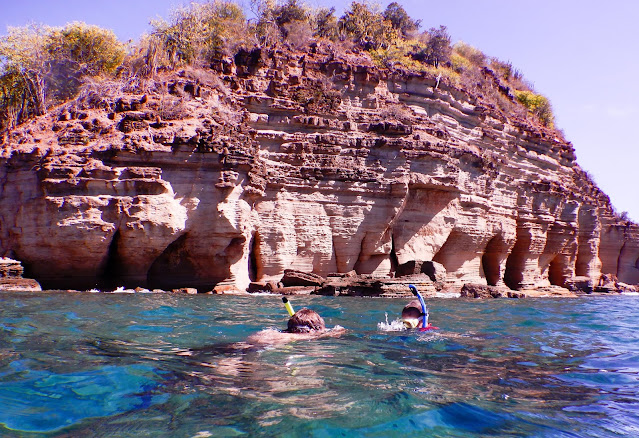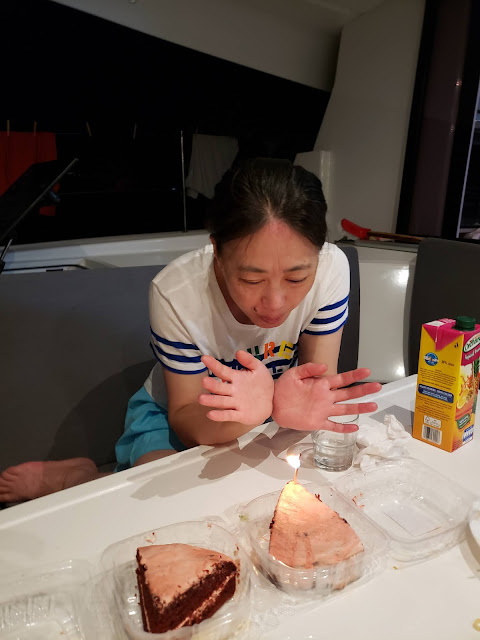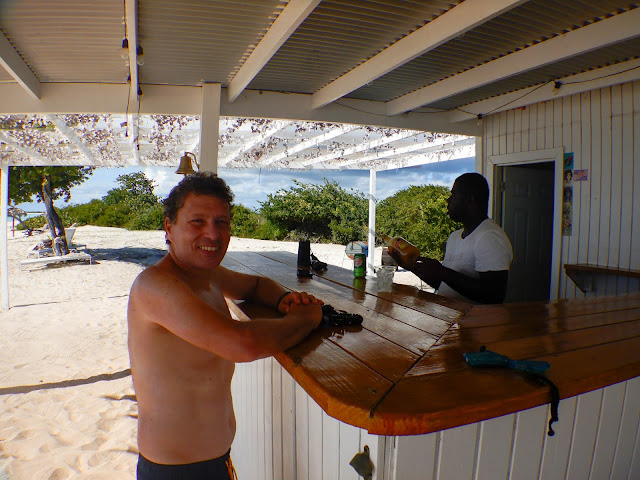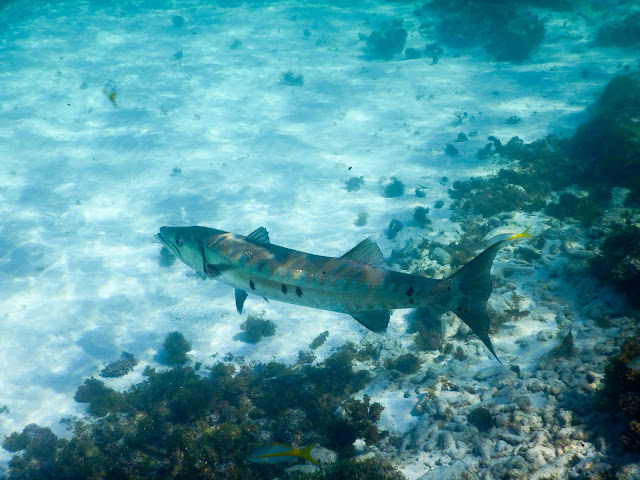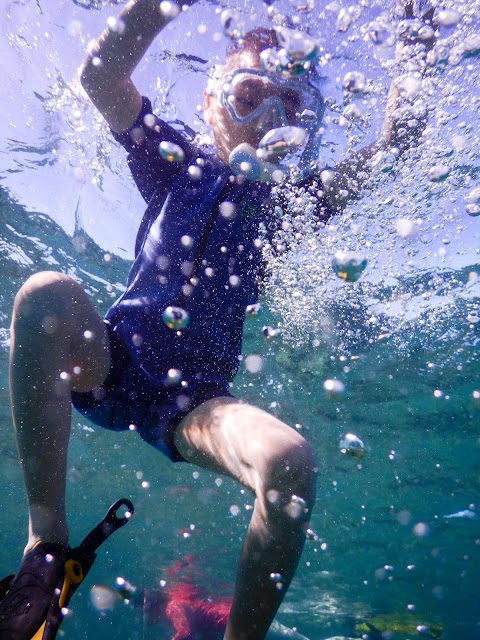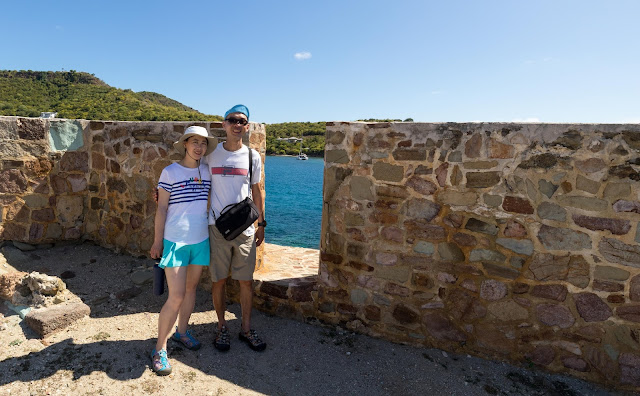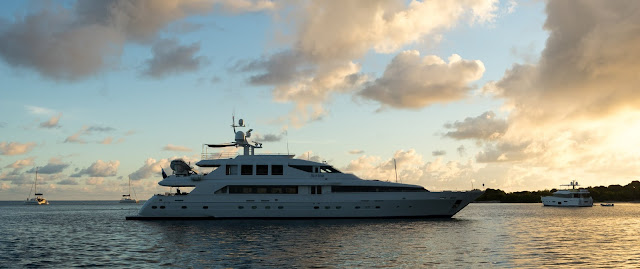
Tuesday, December 21, 2021
November 27th: Deep Bay to Carlisle Bay

Monday, December 20, 2021
Review: Why Geese Don't Get Obese
Why Geese Don't Get Obese is a book on the physiology of animals in comparison to our own, and how our lifestyle as well as our unique features make us susceptible to problems that other creatures don't. It contains many titbits that are really relevant to parents. For instance:
Large numbers of new fat cells are not created—that happens primarily in early life. But if there were twice as many fat cells around to begin with, there would be that many more fat cells with the capacity to become fatter. So, the idea goes, it is especially important not to overfeed young children and toddlers, because this is the time when they can still make additional adipocytes. Overeating, therefore, will cause growth of both the number and the size of fat cells. It is highly probable that overeating in newborns leads to adults with lots of extra adipocytes, just waiting for that next cupcake or scoop of ice cream. (page 28)
This partially explains why obesity runs in families. There are lots of fascinating sections about lung capacity, hormonal responses, and sweat, some of which I didn't know. For instance:
Although perspiration on our upper lip may taste salty, it is actually less salty than our blood. The water in the perspiration comes from our internal stores of water. Thus, when we perspire heavily on a hot day, we lose both water and salt but proportionately more water than salt. (pg. 45)
The section on marine mammals is great. For instance, I did not know that seals expelled all residual air from their lungs before they dove, which is one reason they don't get decompression sickness by ascending rapidly. It turns out that lungs don't hold much more than about 2 minutes of air, which is insignificant for the length of dives the seals and otters do. Avoiding decompression illness is worth losing those two minutes.
I enjoyed the book, even though it's short, and the epilogue is even more interesting, as it describes the experiment on geese which required putting them on a treadmill while measuring their oxygen intake. The diagram is thoroughly entertaining and well worth the time to read. Recommended.
Friday, December 17, 2021
November 26th: Coco Point, Barbados to Deep Bay, Antigua


Thursday, December 16, 2021
Review: A Small Place
A Small Place is Jamaica Kincaid's short essay about Antigua. It drips with sarcasm and tastes of bitterness. Right off the bat, you get an examination of how history glorifies the industrial revolution when the reality was that a huge amount of its wealth came from slavery:
he West got rich not from the free (free—in this case meaning got-for-nothing) and then undervalued labour, for generations, of the people like me you see walking around you in Antigua but from the ingenuity of small shopkeepers in Sheffield and Yorkshire and Lancashire, or wherever; and what a great part the invention of the wristwatch played in it, for there was nothing noble-minded men could not do when they discovered they could slap time on their wrists just like that (isn’t that the last straw; for not only did we have to suffer the unspeakableness of slavery, but the satisfaction to be had from “We made you bastards rich” is taken away, too), and so you needn’t let that slightly funny feeling you have from time to time about exploitation, oppression, domination develop into full-fledged unease, discomfort; you could ruin your holiday. (page 9)
Even though Antigua has been an independent country for some time now, Kincaid doesn't let up on its former colonists, which she blames for teaching its corrupt leaders how to behave:
Have you ever wondered to yourself why it is that all people like me seem to have learned from you is how to imprison and murder each other, how to govern badly, and how to take the wealth of our country and place it in Swiss bank accounts? Have you ever wondered why it is that all we seem to have learned from you is how to corrupt our societies and how to be tyrants? (Page 34)
The book exposes all the corruption, and the sad state of governance on the island, interspersed with scenes from the island describing its beauty and its colors and people. To a large extent, I do wish Kincaid's visited some other former colonies of England's that weren't mismanage. For instance, Singapore was also a former colony, but wasn't nearly as badly mismanaged, and its population is also much larger than Antigua's, so you can't even use the excuse that managing Singapore was an easier job.
To some extent, of course, was luck. Singapore's leaders while every bit as dictatorial as any tyrants could be, at least recognized that rooting out corruption was key to have a successful economy and country. Ultimately, that makes its rulers better off as well, enabling them to have a dynasty that's more stable. The question I'm left with is, "At what point can former colonist countries stop blaming their former colonists and start taking responsibility for the fate of their country?" Kincaid doesn't answer that question. I'll answer it for her anyway: "At what point do you as an adult stop blaming your parents for not giving you a good character forming childhood and start taking responsibility for your actions?"
Wednesday, December 15, 2021
November 25th: Long Island to Coco Point, Barbuda
We woke up at 5:50am, made breakfast, and got going just after sunrise, using dual lookouts to navigate the Prickly Pear Channel out into open water before engaging the auto-pilot. The Garmin auto-pilot on the Chinook was the most sophisticated panel I'd ever seen, capable of going around marked obstacles on the map! I didn't trust it though, and would still disengage it whenever I saw a reef or shallow water marking on the map, as it tended to behave as though you could sail right on the edge of a reef. I personally much prefer to give such objects a ton of leeway, seeing as neither GPS nor my old eyes are very accurate.
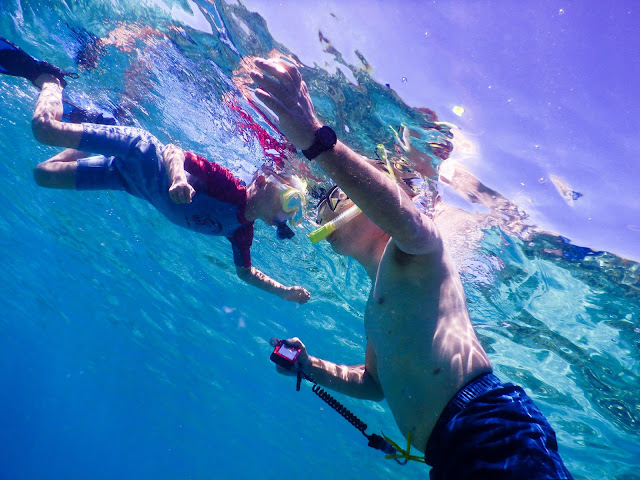

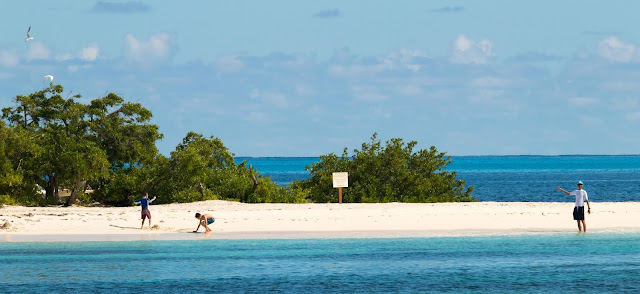
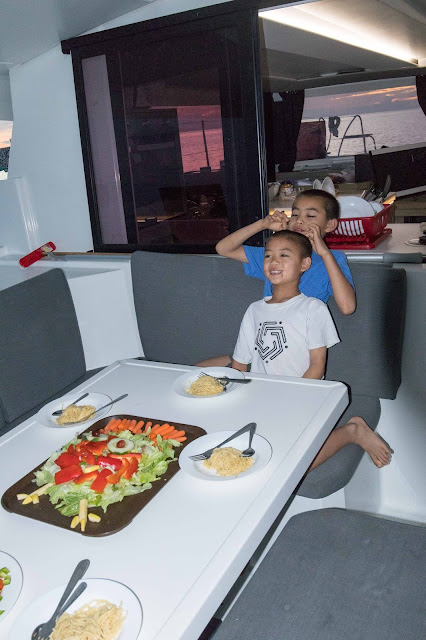
Between the lobster, the turkey, and the sunset, we had ourselves a glorious time. We looked forward to doing more snorkeling the next morning before heading back to Antigua.
Tuesday, December 14, 2021
November 24th: Green Island to Long Island
We woke up bright and early at 5:00am, made coffee, and to our surprise discovered that other boats in the flotilla moor'd and anchor'd behind us were already moving. They must all be on the same plan we were on! Once we were done with breakfast, we moved the boat back out the way we came in and raised the sail! I was delighted to be sailing, and a long sail seemed like a good idea, even though Arturo had said the night before that middle reef had supposedly great snorkeling. There were still enough boats in the Bay that I didn't think it was worth it to try to snorkel there.
An hour later, Arturo said to me, "We're only doing 3 knots. It's 27 nautical miles. This trip will take us 9 hours!" I looked, and sure enough, we were getting at most 6-7 knots of wind, not enough to get to Antigua on sail power alone. We could drop the sails and turn on the engine, but instead we pulled out the charts and guidebook and looked for alternate destinations.
Great Bird Island jumped out at me as a potentially great snorkeling destination, and it had the advantage of putting us into the North Sound, where an anchorage at Long Island would put us at least within decent motoring distance of Barbuda, given the poor wind conditions that were predicted for the next couple of days. "Long Island is near the Antigua airport, but the island doesn't have many flights."
We pulled into the Bay of Great Bird Island at 11:00am, after sailing slowly north, and then turned on the engine. There were no other boats in the Bay when we arrived, but soon after we laid down the anchor and snugged it up, a trio of motorboats sailed up, followed by a commercial boat carrying snorkels. The day had warmed up and was hot, so after I checked the anchor I immediately swam out into the reef and saw to my delight my first glimpse of glass fish!
From the boat, Xiaoqin spotted a turtle, and soon after that everyone was in the water! There was much snorkeling to be had and it was of very good quality. Even after we were all in the boat, Niniane hadn't had enough, and opted to swim all the way to the beach. That sounded like a great idea to everyone else as well, so I helped Arturo lower the dingy, which still needed fixing anyway. Then I got out the paddleboard and paddled to the beach.
Niniane had already arrived by the time I got there, and she was eager to try paddleboarding. I gave her a few tips and she was ready to head out when the dinghy arrived. The kids immediately set about getting wet and sandy, and Xiaoqin and Arturo explored the island while I man-handled the dinghy. We hadn't figured out how to tilt the dinghy's outboard, so you could'nt leave the boat unattended --- you didn't want it to drift away, which was easy to solve with an anchor, but you also didn't want the tide/waves to push it onto the shored, which would hit the outboard propellor and rudder!
Upon arrival at the beach, security showed up and told us that we weren't allowed into the resort because of COVID restrictions. "You can stay in the water." We chose to let Boen play as much as he liked on the beach, and then swam back, finding a Manta Ray and various more Starfish on the way back to the Chinook.
Monday, December 13, 2021
Review: Principles
I was assigned Principles as part of an onboarding reading. I'd never heard of Ray Dalio or Bridgewater Associates before, and I was dubious about yet another business book. But I gave it a shot anyway.
The first 2/3rds of the book were irritating. I generally agreed with Dalio that the most important thing in the world was to face reality, and that you need to iterate constantly towards your understanding of reality and to challenge your view. But I got very annoyed by his choice of words. For instance, he used "evolve" when he meant "improvement." This is a pet peeve of mine, since evolution doesn't actually have any direction or aim. I was also very annoyed by various statements about how the system he found himself in was a good one. I certainly don't think that viruses or mosquitoes do any good. We just have to live with them. I suppose if you become mega rich like Ray Dalio did, you can't help but believe that the universe you live in must be the best of all possible worlds, even if objective reality of the majority of people living around you says otherwise.
The last 3rd of the book ("Work Principles") were however a treasure trove of great ideas and deep insight. For instance, here's a brilliant section on why you need to talk to your skip-level reports, a major mistake many directors (new and experienced) make:
Probe to the level below the people who report to you. You can’t understand how the person who reports to you manages others unless you know their direct reports and can observe how they behave. f. Have the people who report to the people who report to you feel free to escalate their problems to you. This is a great and useful form of upward accountability. g. Don’t assume that people’s answers are correct. People’s answers could be erroneous theories or spin, so you need to occasionally double-check them, especially when they sound questionable. Some managers are reluctant to do this, feeling it is the equivalent of saying they don’t trust their people. These managers need to understand that this process is how trust is earned or lost. Your people will learn to be much more accurate in what they tell you if they understand this (page 459)
Here's another one about how to properly run a post-mortem:
Avoid the anonymous “we” and “they,” because they mask personal responsibility. Things don’t just happen by themselves—they happen because specific people did or didn’t do specific things. Don’t undermine personal accountability with vagueness. Instead of the passive generalization or the royal “we,” attribute specific actions to specific people: “Harry didn’t handle this well.” Also avoid “We should . . .” or “We are . . .” and so on. Since individuals are the most important building blocks of any organization and since individuals are responsible for the ways things are done, mistakes must be connected to those individuals by name. Someone created the procedure that went wrong or made the faulty decision. Glossing over that can only slow progress toward improvement. (Page 479)
Use “public hangings” to deter bad behavior. No matter how carefully you design your controls and how rigorously you enforce them, malicious and grossly negligent people will sometimes find a way around them. So when you catch someone violating your rules and controls, make sure that everybody sees the consequences. (Page 514)
The book has a ton of common sense, and ultimately, if I'd summarize the theme of the book, it's that the management team need to approach an organization the way an engineer approaches code:
Great managers are not philosophers, entertainers, doers, or artists. They are engineers. They see their organizations as machines and work assiduously to maintain and improve them. They create process-flow diagrams to show how the machine works and to evaluate its design. They build metrics to light up how well each of the individual parts of the machine (most importantly, the people) and the machine as a whole are working. And they tinker constantly with its designs and its people to make both better. They don’t do this randomly. They do it systematically, always keeping the cause-and-effect relationships in mind. (Page 451)
You will note that many management books aspire to inculcate this sort of thinking. One good one, for instance, is the Fifth Discipline. I loved the Beer Game as described in that book, because it made a big deal out of how long feedback cycles derail non-systematic thinking. But the rest of the book didn't cover the practical details of how to build a learning organization, whereas Dalio's book does.
Dalio claims that one key approach that makes Bridgewater different, is that it makes its potential employees take a personality test. The resultant attributes are placed together with your track record to create a personnel summary (I imagine this to be something like a D&D character sheet). Then, when you need a team to do X, instead of randomly grabbing people who happen to be available, you can search through your employee database to find the best matches in terms of personality and track record, much like a team of D&D players might say, "We need a cleric, a bard, 2 fighters, and a wizard."
There's also an emphasis on "believability weighted decisions." The idea is that when making a decision, you want the people with the highest believability about that domain. Dalio claims that the believability is based on 2 principles: (1) having done the task (or similar tasks) at least 3 times before, and (2) being able to explain how and why the decision should be made. This is a nice balance between the dummy "democratic voting approach" or the even more dummy "I'm your boss so I'm going to call this shot for you" approach.
I tried the personality test, and got some results. Unfortunately, it still reads a little bit like a horoscope to me --- too generic and not generally all that interesting.
Nevertheless, I really thought the last 3rd of this book more than paid for itself in time spent reading it. It's in a far better class than books like Beyond Entrepreneurship or The Making of a Manager. Your time will be much better spent reading this book instead of any of those.
Highly recommended.
Friday, December 10, 2021
November 23rd: Carlisle Bay to Green Island
Boen's snorkeling equipment had been fixed, and he was now very good at snorkeling. The difference in just a couple of sessions was nothing short of astonishing.
When we were all done, we knew we had to visit tank bay to reprovision the boat, as our provisioning had been incomplete two days ago, and we knew now what we needed. Deli meat, fruits, more bread, more eggs, and most important of all, chocolate! But first, we visited English habor (by accident), and found the bakery that Niniane had talked about (she'd stayed in English Habor before joining us at Jolly Habor), which was open and ate meat pies and other delicacies before we found our way to tank bay.
Tank Bay's supermarket was conveniently situated right on the water with a convenient dinghy dock. We purchased everything we needed, and then headed back to the boat for a quick lunch before driving the dinghy back to English Harbor to visit the old fort.

Doing the hike in the afternoon proved to be a mistake. It was hot, though we brought cold water in insulated containers, and the one mile hike was fortunately short enough that it wasn't a problem.


